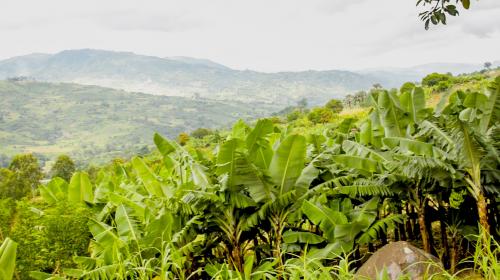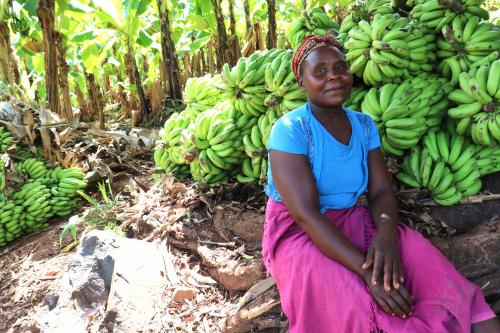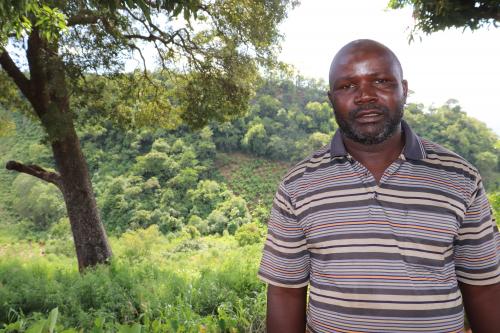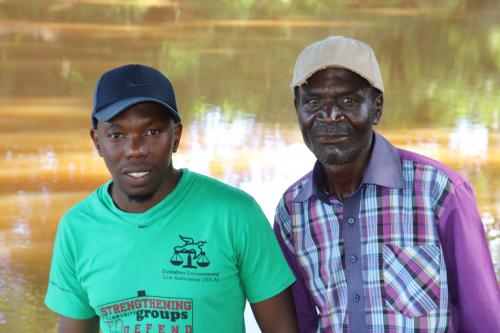The threat to the community of Vhimba

Shifting boundaries
A landmark ruling by the High Court of Zimbabwe in November 2018, has brought some immediate relief to around 300 people of the Vhimba community in Chimanimani.
Last October residents in in Chikware and Mapombere villages were threatened with a 72 hours eviction notice by the Zimbabwe Parks and Wildlife Management Authority. Due to rapid intervention this threat was rejected by the Court as unlawful and arbitrary.
This is just the latest chapter in the long history of dispossession of people living in this remote but beautiful area of Zimbabwe close to the Mozambique border.
Since colonial times land has been taken from the people of Chimanimani, including the establishment of the Chimanimani National Park in the 1960s.
The boundaries have continuously been redrawn since the 1990s, leaving the community, who mostly depend on banana production for a living, surviving on fewer and fewer natural resources.

The threat in late 2018 came from armed officers of the Zimbabwe Parks and Wildlife Management Authority, commonly known as ZimParks, who ordered the community to vacate within three days. Stanley Tsanana recounts the threat that
“…if we do not leave the place many helicopters would come… [and] would bomb us”.
The threats were traumatising to the residents. Martha Muyango recalls,
“When I saw the gun I shivered. I thought the war had returned… because I saw the pains of war, it was devastating… the thought we were returning to war really scared me”.
The residents insisted that they had nowhere to go other than their own homes and no other means of support but were told not to question the order and to vacate. In this video the people of Vhimba talk about the shock of the eviction threat:
The initial threats were followed up when armed officers returned and threatened to burn houses and destroy crops if the families didn’t leave. Women were arrested in their fields. Patience Ngorima, who was handcuffed along with her sister in law declared,
“My whole life I had never been arrested… up to 41 years I had not been arrested”.
Fortunately a well-connected individual, Reuben Manyange came to hear of the community’s predicament and knew that such arbitrary evictions could not be constitutional. He was also disturbed by the behaviour of the agents,
“From what I heard, one of the villagers’ dogs was shot by the authorities. So one would be very scared because they wouldn’t know what to do next or where to go”.
Through his network of contacts he was put in touch with the Zimbabwe Environmental Law Association (ZELA), a public interest law group that promotes environmental justice in the natural resource and environment sector. In this case ZELA could see no justification for the expropriation of the community’s land and according to Darlington Chidarara, Legal Officer at ZELA,
“We had a distressed call from the communities of Vhimba, who were about to be evicted from their land where they have been staying for over 100 years… So, we took the call and rushed to Vhimba.”

Far away from scrutiny, force was being used in an unconstitutional manner to remove an inconvenient community with no regard their rights.
ZELA discovered that legal process had not been followed – no court order had been obtained in advance for the eviction. Without this any eviction would be unlawful as the circumstances would not have been considered fully and determined by a court.
This was brought to the attention of the media and a case was brought rapidly to the High Court in Harare who ruled on 7th November 2018 to prohibit the eviction on the basis that this would amount to unlawful and arbitrary eviction.

Not yet resolved
This judgment provides immediate relief from the threat but still leaves the community vulnerable. Reuben Manyange welcomed the verdict, which brought much needed respite for the community but comments,
“I can’t say the issue has been resolved because they haven’t shifted or removed the boundary markers.”

There is no proper determination of the National Park area, just paint marks placed on rocks and people’s properties.
There is a great suspicion that behind the eviction attempt is a land grab for valuable mineral resources. Diggers and other heavy machinery have been seen excavating along river banks in the area, activities that clearly have nothing to do with environmental or wildlife conservation. Many illegal gold-mining operations upstream are already contaminating water sources in the area.

Steady Hlabiso, the Headman of Ngorima is clear:
“Our elders have always lived on this land… Even if we look at the map it is titled as Ngorima Communal Land. It’s not a Reserved Land, it is a Communal Land.”
Nyaradzo Mutonhori, Senior Programmes Officer at Zela, points out the vulnerability of their status.
“The challenge is that according to the law, Communal Land dwellers only have the right to use the land but they do not own the land… some of these communities dwelling on Communal Land are indigenous peoples who have dwelt in these areas for hundreds of years and there is really no record of them staying there, so as a result most of the communal dwellers are then labelled as squatters.”
This lack of formal land rights leaves such communities at the mercy of unscrupulous actions.
Steady Hlabiso, meanwhile is ready to work with the authorities,
“ZimParks… should work together with us, the Chiefs, so that they show us their real boundaries, where they start to where they end.
“The Chiefs will know the restricted area, then we will also help to safeguard that area.”
All evidence shows that the best environmental protections are based on engaging and benefiting the local communities rather than excluding them. As Nyaradzo Mutonhori argues,
“Instead of the state seeking to remove them… they should be seeking for solutions towards working together with the Vhimba people to maintain the forests and the land.”
The Vhimba people have occupied this Communal Land for generations with no formal title of ownership. The Court’s 2018 decision will not protect them from a renewed attempt that does follow legal process.
Only securing formal land rights can prevent further attempts to take their only place of residence and source of livelihood away from them.

